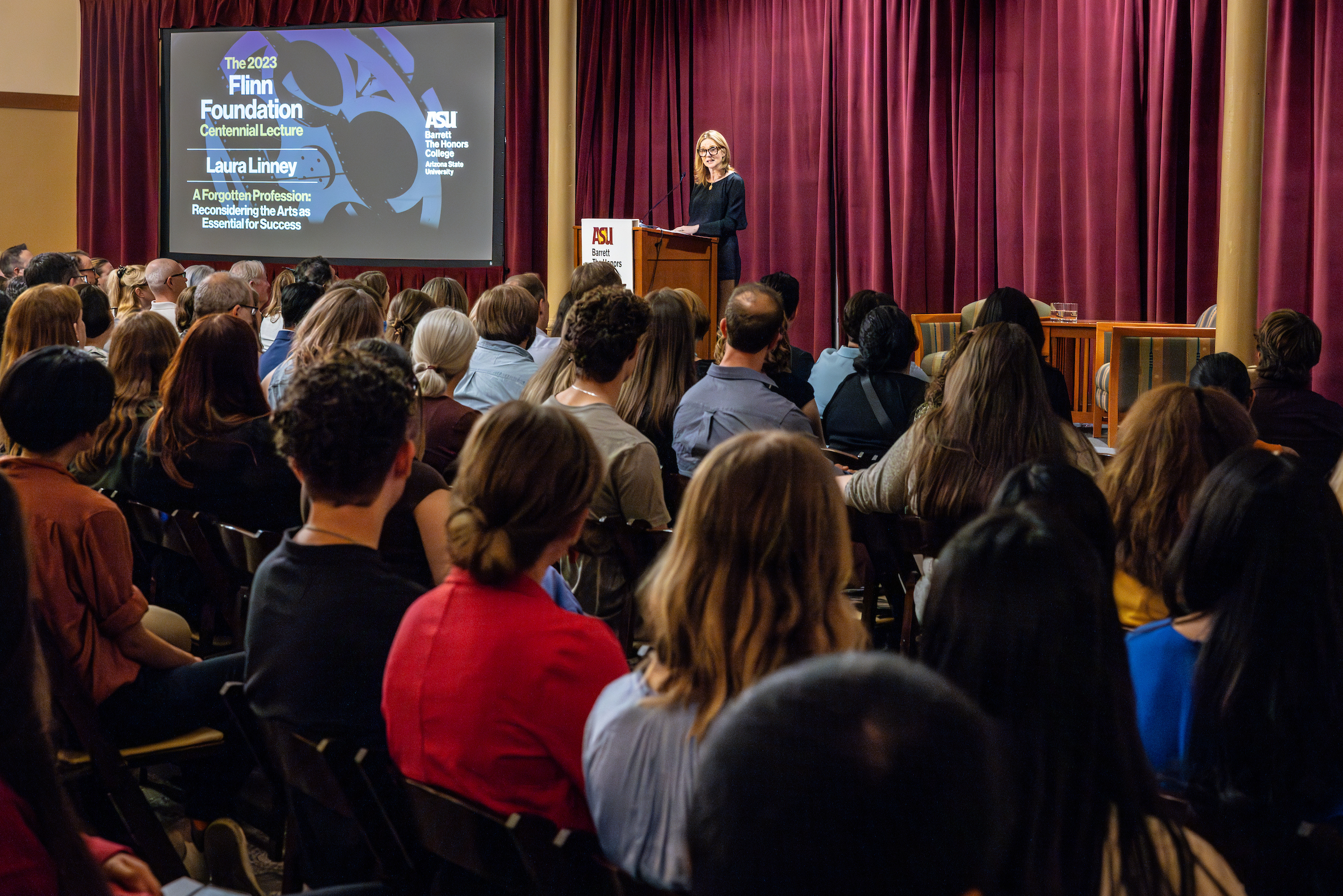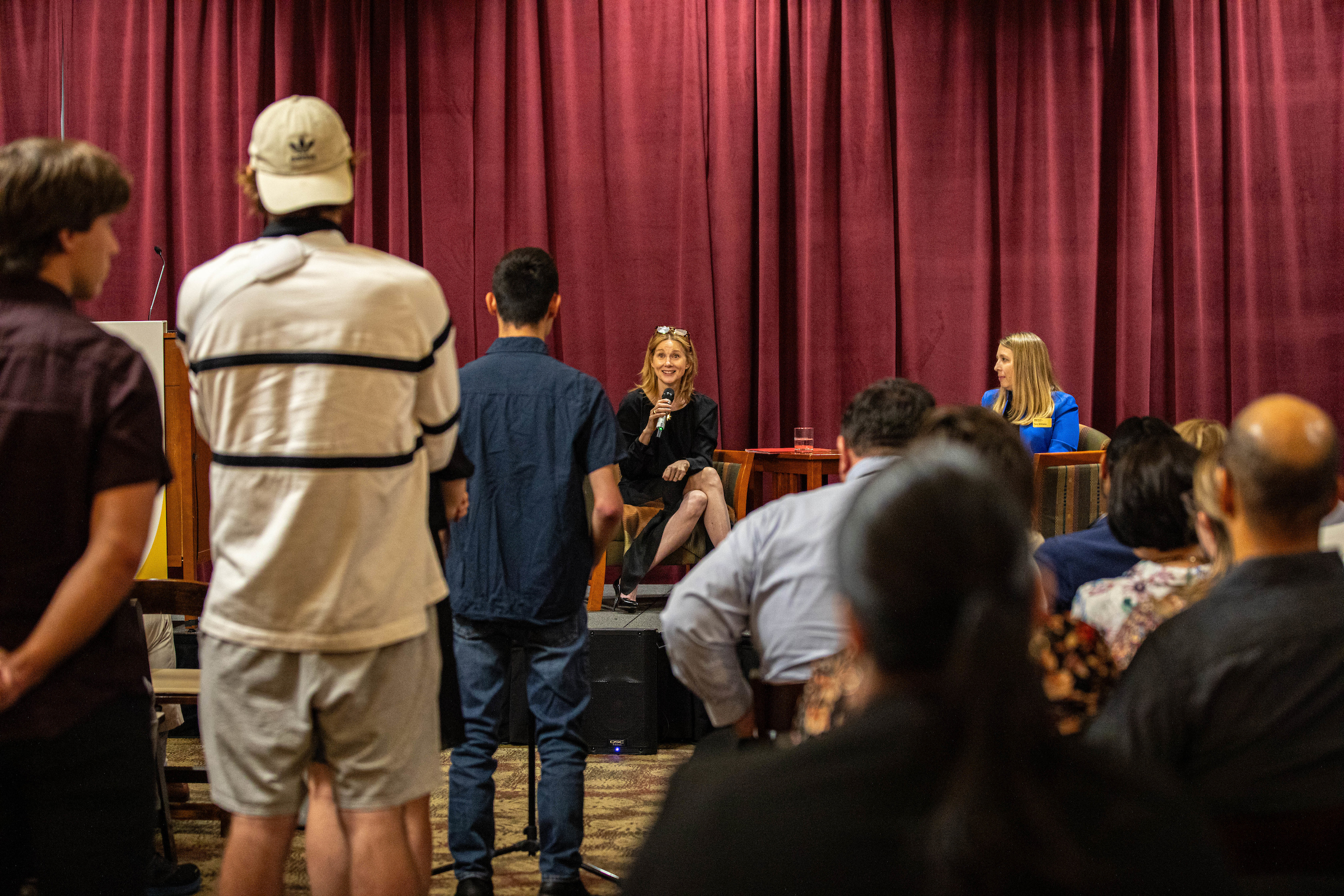In her fifth decade of life, actress Laura Linney has had a recurring theme drift through her thoughts.
“I believe with every cell of my being that the arts are one of the most precious, powerful and underutilized resources we have as human beings, especially in the United States,” Linney said. “Not only for our own individual evolution, but for our mental and spiritual and intellectual health, as well as for our families, our neighborhoods, our culture and for our country at large.
“Personally, the arts have continuously benefitted my life in intangible and profound ways for decades; I have witnessed its impact on others and I’m always in awe of its ability to connect, refresh and inspire.”
Linney, who has been nominated for three Academy Awards and won four Emmy Awards, was the guest speaker at Arizona State University's Flinn Foundation Centennial Lecture held Tuesday in Old Main on the Tempe campus, and hosted by Barrett, The Honors College.
The title of the lecture, "A Forgotten Profession: Reconsidering the Arts as Essential for Success," was near and dear to Linney’s heart.
Linney told an enthralled audience that the arts isn’t just for artists.
“Lessons that are learned in theaters and dance studios, music rooms, photographic dark rooms, drafting tables and art studios will enrich and equip young people with tools that will help them in whatever field they may eventually end up in,” Linney said. “There is no better teaching to learn these invaluable lessons from — discipline, collaboration, courage, endurance, patience, faith, analytical and creative thinking, humor, history, reason, trust, process and dedication. … The arts connect the mind to the body and then the body to the spirit.”
Around 200 people attended the 2023 Flinn Foundation Centennial Lecture given by actress Laura Linney and sponsored by ASU's Barrett, The Honors College. Photo by Charlie Leight/ASU News
Linney said she believes the arts is even more essential today because society has placed value on status and power rather than creativity.
“If given the chance, the arts will reconnect you to the vibrancy of your own soul. You learn about service and responsibility. The arts can visually and emotionally expose you to the previously unseen, unfelt. It can introduce all of us to parts of ourselves we had no idea existed. The arts connect us to the universal experience, provide a place for human expression with the emphasis on human, so that we may progress and evolve as a species in a world of wildly different lifestyles and worldviews.”
Linney said that as she has thought about the honorary Doctor of Fine Arts degree she received from her alma mater, The Juilliard School, in 2009, she’s come to wonder why there isn’t a "doctor" of the arts.
“The arts can save you,” Linney said. “They can save you from depression, from loneliness and stagnation. Listen to music. Read a play. Read a short story, a poem or dance when no one is looking. Wouldn’t it be wonderful if we could go to a doctor of the arts and have them diagnose our ailment and then prescribe the most healing art for our situation?”
The arts also are important, Linney said, because they force you to embrace and accept failure. She recalled a Henrik Ibsen Broadway play early in her career in which she was miscast and torched by critics. She asked her mentor, actress Joanne Woodward, what she could do. Woodward, she said, looked her squarely in the eye and said, “Dear heart, there’s nothing you can do.”
“If, in those circumstances, you are not blessed with ignorance, it is agonizing, humbling, humiliating and dispiriting,” Linney said. “However, there is much to be learned during those tedious, haunting experiences. And if it is not injurious, you must befriend it. Embrace failure as the unwanted opportunity to greet and live within discomfort.”
After her speech, Linney took questions from Tara Williams, dean of Barrett, The Honors College, and audience members. One man asked Linney how she deals with criticism.
“Well, first and foremost, you have to love what you do more than anyone’s opinion,” she said. “People are going to say some mean and horrible things. So you have to have a foundation of connection to your work in a way that is unshakeable and that no one can take away from you.
“I realized at one point I was getting a bunch of bad reviews, and I was like, ‘You know, it is not a reviewer’s job to tell me how to feel about my own work. I know how I feel about my own work. No one has to tell me. I know if it’s good, and I know when it’s bad.' Your work doesn’t belong to someone else. It’s yours.”
Attendees line up to ask actress Laura Linney questions following her lecture held at ASU's Old Main on the Tempe campus on Oct. 17. Photo by Paula Soria/Arizona State University
Linney encouraged everyone in the audience, no matter their profession, to be “touched” by the arts.
“It is a resource worth pursuing because everyone should be an artist of some kind,” she said. “There should be an element of artistry in all of us. We should bring it to every aspect of our lives, whether your pursuit is to be an actress or a painter, a cinematographer, a dentist, a mathematician or an entrepreneur, an engineer, stock trader or a plumber.
“Use the arts to focus your attention, sharpen your powers of observation and expand your curiosity.”
Top photo: Actress Laura Linney delivers the 2023 Flinn Foundation Centennial Lecture titled "A Forgotten Profession: Reconsidering the Arts as Essential for Success" on Tuesday, Oct. 17, in Old Main on ASU's Tempe campus. Photo by Charlie Leight/ASU News
More Arts, humanities and education

From ASU to the open road: Alumna Gabriella Shead builds a career behind the scenes of Broadway tours
For ASU alumna Gabriella Shead, a career in the theater isn’t about taking center stage — it’s about making sure everything behind the curtain runs seamlessly. Now serving as assistant company…
Canon brings ‘Star Wars’ cinematographer to inspire Poitier Film School students
David Klein never had a mentor.He was scrappy — and lucky — enough to succeed without one as a career cinematographer. His first feature film was the no-frills, DIY darling of ‘90s indie cinema…

Illuminating the season: How a business professor turns holiday lights into lessons on creativity and sustainability
On a December night in Chandler, Arizona, Kevin Dooley’s house doesn’t just twinkle. It beams like a beacon at the end of the cul-de-sac as the windows shimmer with color, and every corner…


